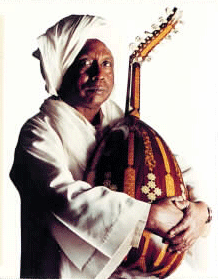Hamza El Din

I've developed a fascination with oud music in the last couple of years - to the extent that I even bought a beginner's oud on Ebay and found some free online tutorials in the hope that I might learn to play. This year being a little crowded and complicated, I haven't gotten much further than plucking and admiring the instrument, but I look forward to rewarding myself with practice time this summer. (A musician acquaintance says I really should find an oud teacher in order not to develop bad playing habits, but that is definitely not in the budget.) Last year I picked up a used copy of Hamza El Din's CD A Wish and I've played it so often I have all the tunes memorized.
I just learned today that Hamza El Din died this week. Jon Pareles wrote his NY Times obit, a shorter version of which was published in the Long Beach Press Telegram:
He made quite a musical dinThere's a nice summary of his work here, too. (If you're not familiar with the sound of an oud, listen to a few of the recordings on this site.)
By Jon Pareles , The New York Times
(Long Beach Press Telegram)
Hamza El Din, an oud player and composer who reinvented the musical culture of Nubia and carried it worldwide, died Monday in Berkeley. He was 76.
The cause was complications after surgery, said his wife, Nadra.
El Din's austere, hypnotic music was based on his research into the traditions of Nubia, an ancient North African kingdom on the upper Nile, which was a cradle of civilization.
Hamza El Din was born in 1929 in Egypt, in what had been the territory of ancient Nubia, a crossroads of trade that flourished as early as the fourth millennium B.C. Nubia's former territory is now part of Egypt and the Sudan, and El Din's hometown, Toshka, was flooded after the building of the Aswan High Dam in the 1960s. He studied electrical engineering and worked for the national railroad in Cairo, Egypt.
But he was drawn to music, first playing the round hand drum called the tar and then taking up the oud, a six-stringed lute.
When he learned about the plans to build the Aswan Dam, which flooded much of ancient Nubia, he grew determined to preserve Nubian culture.
He studied Arabic music at Ibrahim Shafiq's Institute of Music and at the King Fouad Institute for Middle Eastern Music. He also traveled through villages in Egypt by donkey, collecting Nubian songs. With a grant from the Italian government, he studied Western music and classical guitar at the Academy of Santa Cecilia in Rome.
He drew on his studies, and on surviving Nubian traditions, to create music that fused rhythms and inflections from Nubia with Arabic classical elements and a virtuosic approach to the oud, an instrument not traditionally played in Nubia. El Din performed in 1964 at the Newport Folk Festival and recorded two albums for the folk label Vanguard in 1964 and 1965. He moved to the United States, where he was a mentor to musicians, including the guitarist and oud player Sandy Bull. He settled in the San Francisco Bay Area. In 1971 his album "Escalay (The Water Wheel)" was released on the Nonesuch Explorer label.
Mickey Hart of the Grateful Dead produced El Din's album "Eclipse" (Rykodisc); El Din helped arrange for the Dead to perform at the Great Pyramids in Egypt in 1978.
El Din also made albums for Lotus Records and Sounds True. His music was used for movie soundtracks and for dance pieces by the Paris Opera Ballet, Maurice Bejart Ballet and the San Francisco Ballet; and he composed music for a version of the Aeschylus play "The Persians," directed by Peter Sellars at the Salzburg Festival.
He had stints teaching ethnomusicology at Ohio University, the University of Washington and the University of Texas. During the 1980s, with a grant from the Japan Foundation to work on a comparative study of the Arabic oud and the biwa, a Japanese plucked lute, he moved to Tokyo, where he lived until the mid-1990s.
El Din collaborated with ensembles including the Kronos Quartet, which recorded an arrangement of "Escalay" in 1992. When he returned to the United States, he resettled in the San Francisco Bay Area.
His most recent album, "A Wish" (Sounds True), was released in 1999, but his wife said that he had recently completed recording a new album.

0 Comments:
Post a Comment
Subscribe to Post Comments [Atom]
<< Home